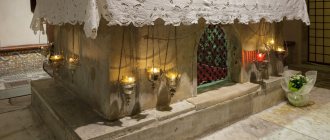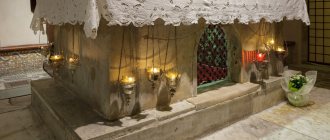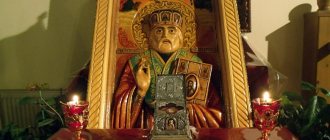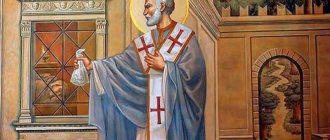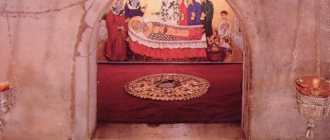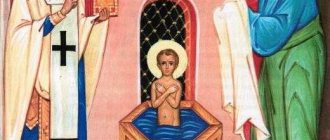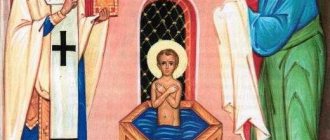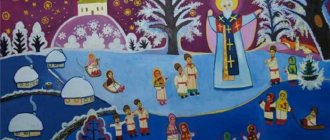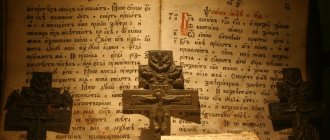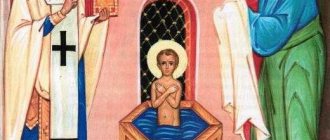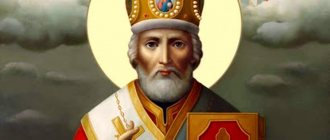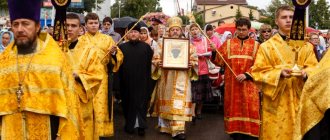The birthday of St. Nicholas the Wonderworker falls on August 11th. This day is one of the most revered among Orthodox Christians. Saint Nicholas is respected for the miracles he performs, helping people after praying to him. In ancient times, the saint was considered an assistant to sailors and merchants, unjustly convicted people and children.
St. Nicholas Day
The holiday of St. Nicholas the Wonderworker in the Orthodox Church is celebrated three times a year. These are December 19, May 22 and August 11 (new style). The first date is the day of repose, that is, the death of the saint. August 11 marks the birth of St. Nicholas the Wonderworker. May 22 is the day of the arrival of the relics of St. Nicholas the Wonderworker in the city of Bari (Italy).
In the 11th century, part of the relics was stolen from the city of Myra by Barian merchants. They brought the relics to their hometown, increasing its fame, prestige and trade volumes. The merchants' motives were mercantile, but the townspeople greeted the arriving relics with celebration and reverence. The transfer of the holy remains to the local church was accompanied by numerous healings of the sick.
The holiday of St. Nicholas the Wonderworker, dedicated to the transfer of relics, is celebrated in some countries, including Russia. The relics are still kept in this city, in the Basilica of St. Nicholas. Another part of the relics of St. Nicholas the Wonderworker was later transferred to Venice.
Tomb of St. Nicholas the Wonderworker in Bari (Italy)
Celebrating the Nativity of the Wonderworker
On this day, August 11, Orthodox Christians go to church for services. A sacred service is held there, glorifying the Birth of the holy saint. Orthodox Christians bow before the images of the saint in their prayers and light candles for the health of relatives and loved ones. If you can’t go to church, you can read prayers at home.
Also on this remarkable day, Christians perform good deeds and make donations. They help children from orphanages, schools and boarding schools with money, clothing and food, and also provide assistance to low-income families. After all, good deeds help to become closer to the Lord and honor the memory of the great saint. On the birthday of Nikolai Ugodnik, you should not forget about your family. Together with your family and friends, you need to pray and celebrate the holiday of a saint who helps people who believe in him.
Basic prohibitions
On this day you can not do everything you want. In addition to the fact that Orthodox Christians should devote time to prayers to the holy saint, they should be aware of the existing prohibitions.
On this day it is prohibited to do the following:
- Work in the garden and in the garden. This holiday is important. Services are held in churches, so it is better to devote the day to prayers rather than to working on the ground.
- Knit, sew and embroider.
- Clean the house: wash windows and floors, wipe off dust.
- Do laundry or ironing.
It is better to spend these hours in harmony with yourself, relax and engage in spiritual development - read books, pray, chat with friends. You need to behave calmly with your family and friends, you can’t quarrel with them. Then fate will be favorable to the household, and misfortunes will bypass the home.
Recourse
Saint Nicholas always helps people when they contact him. People of different ages approach Mikola with petitions, regardless of whether they are students, schoolchildren, directors or ordinary workers. He helps everyone without exception . You can turn to him for help in difficult life situations, and also pray:
- About successful studies.
- Fulfillment of desires.
- Good job.
- Increasing income.
- About healing from illness.
On August 11, we need to offer words of thanksgiving for all the good that the saint has done for people. You should pray before the face of the saint and thank him for his help, as well as repent and ask for forgiveness for the sins you have committed. On this special day, the saint will help anyone who sincerely repents of their actions and wants to change their life for the better.
Unmarried girls ask Nicholas the Wonderworker for help in starting a family. They believe that he will help them establish a happy family life. Eyewitnesses testify that Saint Nicholas comes to the aid of people living in different parts of the world who are looking for family happiness and love.
Life of St. Nicholas the Wonderworker
Nicholas the Pleasant is one of the most revered Christian saints. The holiday of St. Nicholas the Wonderworker is celebrated in many countries even by people far from the Church.
The saint was born around 270 in the city of Patara, in the Roman province of Lycia (modern Turkey). Nikolai was raised in a wealthy Christian family and from early childhood sought to know God. The boy diligently studied the Holy Scriptures and spent a lot of time in prayer. After the death of his father and mother, Saint Nicholas distributed his inheritance to the poor. According to one version, Nicholas went from a reader to a priest and bishop of the city of Myra. According to another, he became a bishop immediately from a layman, thanks to a miraculous sign.
The life of Saint Nicholas experienced one of the longest periods of persecution of Christians in the Roman Empire. This period lasted from 303 to 311. Then came a relatively safe time for Christians: their communities developed, the fight against paganism and heresies (distortions of the true doctrine) was waged. Bishop Nicholas also made a significant contribution to the development of Christianity. According to church tradition, he participated in the Ecumenical Council of 325. There he decisively denounced the heresy of Arianism, which did not recognize the consubstantiality of God the Father and God the Son.
Saint Nicholas died in the city of Myra around 345. After death, his body began to flow myrrh and became an object of pilgrimage. For Christians, Nicholas the Wonderworker is the patron saint of travelers, the slandered, prisoners and orphans. This image of the saint was formed on the basis of many good deeds and miracles he performed.
Orthodox Life
Sputnik Georgia
On August 11, the Russian Orthodox Church celebrates the Nativity of St. Nicholas the Wonderworker, Bishop of Myra in Lycia. Nicholas the Wonderworker, also called Nicholas the Pleasant in Russia, is one of the most revered saints by Christians.
© Sputnik/ Alexander Lyskin
According to the church calendar, celebrations in his honor are held twice a year - on December 19, the day of his death, and on May 22 - in memory of the transfer of the saint’s relics from Myra Lycia (the territory of modern Turkey) to Bar (Italy).
Life
Saint Nicholas was born in 258 in the city of Patara, near Lycia, on the southern coast of the Asia Minor peninsula. His parents Theophanes and Nonna were pious and righteous Christians, but for a long time they were childless, about which they were very sad and constantly prayed to God to send them a child.
The Lord heard their prayers and sent them a son, and they made a vow to devote their only child to the service of God. At birth he was given the name Nikolai, which means winner of nations. And he, by the blessing of God, truly appeared as a conqueror of evil, for the benefit of the whole world.
Saint Nicholas showed his first miracle at his very birth, healing his mother from a serious illness. Then the newborn, while still in the baptismal font, stood on his feet for three hours, unsupported by anyone, thus giving honor to the Most Holy Trinity. On fasting days, the child spontaneously accepted mother's milk only once, in the evenings.
Since childhood, he was different from those children who played loudly in the streets all day long. When Nikolai learned to read, he almost immediately began studying the Holy Scriptures and other spiritual books.
© Sputnik/RIA Novosti. Icon "Nicholas the Wonderworker"
He spent his nights in prayer, and his days in righteous labors. He avoided vain friends and idle conversations in every possible way, avoided conversations with women and did not even look at them.
His uncle, Bishop Nicholas of Patara, seeing such zeal and chastity, made the young man a reader, and then elevated him to the rank of priest.
The miracle worker led an ascetic lifestyle, that is, he even ate food only once a day in the evenings. Throughout his life the saint deliberately deprived himself of all blessings. Nikolai gave all his wealth, inherited from his parents, to the poor and needy. Thus, he devoted his earthly existence to serving people and God.
After some time, Nikolai Ugodnik ended up in the city of Myra, the capital of Lycia, where no one knew him. He lived like a beggar, but attended religious services day after day. At the same time, the archbishop died in Myra and the bishops at the council tried in vain to elect a new one.
Through the prayers of one of the elders, there was a vision that the first person to enter the temple before the midnight maiden should become an archbishop. He turned out to be the humble and meek Saint Nicholas.
The new archbishop became a real protector of the poor and disadvantaged. He cared for his flock with great love. Under Emperor Diocletian, a persecutor of Christians, Saint Nicholas was imprisoned, but even there he preached and took care of the prisoners.
Despite his great meekness of spirit and purity of heart, Saint Nicholas was a zealous and courageous warrior of the Church of Christ.
Fighting the spirits of evil, the saint went around pagan temples and temples in the city of Myra itself and its environs, crushing idols and turning the temples to dust.
In 325, already under Emperor Constantine, Archbishop Myra of Lycia, among others, was invited to the First Ecumenical Council in Nicaea. There, Saint Nicholas not only denounced the heretical teaching of Arius, but even struck him on the cheek for blasphemy.
Those present considered this to be excessive jealousy, and the saint was defrocked and sent to the prison tower. However, the miracle worker was soon returned to the cathedral, having been convinced that he was right.
Having reached a ripe old age, Saint Nicholas died peacefully around the year 351.
His venerable relics were kept incorrupt in the local cathedral church and exuded healing myrrh, from which many received healings.
In 1087, his relics were transferred to the Italian city of Bari, where they rest to this day.
Miracles
Saint Nicholas became famous for many miracles - he saved Lycia from famine, during a rebellion that broke out in Phrygia, he helped three imperial commanders pacify the crowd and resolve the conflict peacefully.
With prayer he stopped the sea elements. This happened during the miracle worker’s water journey to the Holy Land. The saint predicted that a hurricane would strike and the ship would sink, but his prayers changed the treacherous intentions of nature.
The miracle worker saved from certain death three men who, through the fault of fate, were among the innocently convicted. Nikolai simply held the murder weapon, which the executioner raised over the heads of the unfortunate people, and the accuser, realizing who was in front of him, repented of his plans.
© Sputnik/ Yuri Prostyakov. Fragment of the icon “St. Nicholas the Wonderworker of Zaraisk with his Life”
He also saved the three daughters of an impoverished old man from dishonor. Three times on a dark night he threw wallets with gold coins through the old man’s window, and the old man managed to marry all three daughters with a dowry to worthy people.
It is impossible to count his miracles in the same way as it is impossible to describe all of them in detail.
The miraculous icon of St. Nicholas the Wonderworker is one of the most revered Orthodox images of Saints. The divine image is addressed in prayer in various life situations, and as people say, with the sincere request of believers, it quickly responds and comes to the aid of those in need.
history of the holiday
The exact time of the establishment of the celebration of the Nativity of St. Nicholas the Wonderworker is unknown. Most likely, this holiday was originally local in the Lycian Worlds of Asia Minor, where the saint served as an archbishop, and in the homeland of his parents.
Then, at the time of the Crusades, the holiday could spread throughout the Nicene Empire and from there come to Rus', where the saint was deeply revered since ancient times.
Presumably, this church celebration also existed among the ancient people - the Greeks, who lived in those distant times on the territory of the Russians, but so far this information has not been confirmed.
Since the ninth century, Nikolai Ugodnik was revered in Rus' as the heavenly patron of sovereign power - it was believed that he especially patronized the Orthodox kings.
© Sputnik/ Alexey Varfolomeev. “The Wonderworker Nicholas of Myra and the Wonderworker Sergius of Radonezh”
It is also known that in the 13th century the tradition of celebrating his Nativity in the Russian Orthodox Church already existed; in Veliky Novgorod there was even a monastery dedicated to the Nativity of St. Nicholas.
However, during the reign of Catherine the Great, the church-wide celebration of the Nativity of St. Nicholas the Wonderworker in Russia was abolished. The celebration was resumed several centuries later, and in honor of the feast of the Nativity of St. Nicholas, a troparion and kontakion were compiled, known from ancient times in the liturgical life of the Russian Orthodox Church.
There is also information that one of the surviving church services dedicated to this holiday was compiled during the patriarchate of Nikon in 1657.
The holiday of the saint's birth was revived in 2004 with the blessing of Patriarch Alexy II of Moscow and All Rus', and therefore is not yet very widely known in Russia.
Honoring a Saint
The veneration of Saint Nicholas very quickly spread throughout the Christian world, both in the East and in the West. Numerous churches were dedicated to him, people turned to him in prayer, hoping for healing and help.
From folk legends that have appeared over the centuries, we learn that St. Nicholas helped the poor and unfortunate by quietly throwing gold coins into shoes left at the door at night and placing pies in the windows.
Around 960, the first musical work about St. Nicholas was written in the West, where a new version of the translation of the saint’s life was proposed: instead of the word “innocentes” (innocents) in relation to the three inhabitants of the World, unjustly sentenced to death, “pueri” (children) was used. .
Due to the incredible success of this medieval musical work about the holy bishop, the tradition of venerating St. Nicholas as the patron saint of children arose. However, even before this, sailors, prisoners, bakers and merchants chose him as their heavenly intercessor.
What do they pray for?
People pray to Nicholas the Wonderworker in a variety of life trials, and, as people testify, he soon answers the prayers of believers.
They pray to Nicholas the Wonderworker for those traveling (remembering how St. Nicholas, through the power of prayer, pacified a storm that broke out at sea, which almost sank the ship on which the Wonderworker Nicholas was located).
They pray to St. Nicholas for the successful marriage of their daughters (remembering how St. Nicholas secretly donated money for a dowry to the daughters of a ruined man so that they could get married).
They pray to the saint for deliverance from hunger. During his lifetime, Nicholas the Wonderworker became famous as a pacifier of warring parties, a defender of the innocently convicted, and a deliverer from needless death.
There is no strictly obligatory list of things to do to pray to each saint. Therefore, you can pray to St. Nicholas, like other saints, for help in all difficult situations.
On August 11, you can ask St. Nicholas for the most secret things, if, of course, you believe in God. And have no doubt - your request will be heard by the miracle worker.
Sputnik Georgia
Acts and miracles of Nicholas the Wonderworker
Church tradition contains many amazing stories about St. Nicholas. For example, he helped collect a dowry for the three daughters of a ruined rich man. This allowed them to marry safely and thus avoid shame. After all, the desperate father intended to use the girls’ beauty for shameful earnings. Saint Nicholas secretly planted gold three times for each daughter. Twice he managed to return home undetected. But the third time, the girls’ father tracked them down, recognized his benefactor and, in gratitude, threw himself at his feet. The saint ordered not to tell anyone about his act.
In his youth, Saint Nicholas went to study in the city of Alexandria. During a sea voyage, he resurrected a sailor who had died from a fall from a height. On the way back, the saint saved another sailor.
One day, a rebellion broke out in one of the provinces of the empire, and Tsar Constantine I sent an army to suppress it. During the campaign, the soldiers had a camp near the city of Myra. Some warriors began to loot and oppress the local population, which led to unrest. Saint Nicholas found out about this, immediately went to the military leaders and convinced them to pacify the soldiers.
Saint Nicholas also saved three governors who were sentenced to death on the false accusation of envious people of plotting against the emperor. On the night before the execution, the condemned in prison prayed to St. Nicholas, with whom they were personally acquainted. Saint Nicholas appeared to the emperor in a dream and strictly ordered the release of the innocently convicted. The tsar freed the governor and through them gave gifts to St. Nicholas.
Saint Nicholas the Pleasant and Nicholas the Wonderworker
In the history of the Christian church there was another Saint Nicholas of Lycia, revered as a miracle worker. This is Saint Nicholas of Pinar, who lived in the 6th century. The similarity of the biographies and the short time interval between the periods of the lives of the saints led to the fact that in many lives these two personalities merged into one.
Therefore, for a long time it was believed that in Christianity there was only one saint, St. Nicholas the Wonderworker. Some details of the life of Nikolai Pinarsky (for example, the names of his parents and a visit to the Holy Land) are still attributed to Nikolai Ugodnik, who lived two centuries before him. It is worth noting that this confusion did not extend to the holiday of St. Nicholas the Wonderworker.
Veneration of St. Nicholas in Rus'
St. Nicholas has been widely revered in Russia for many centuries. Until the beginning of the 20th century, babies in our country were most often named in honor of this saint. Temples and icons dedicated to St. Nicholas the Pleasant were second only to the Mother of God in number.
Saint Nicholas repeatedly defended and strengthened Rus' in difficult times. For example, during the siege of Mozhaisk by the Mongols, a wondrous sign happened: St. Nicholas appeared in the sky as the defender of the city and drove away the enemies. In honor of this wonderful event, an icon of St. Nicholas of Mozhaisk was painted, which became miraculous.
There is a legend about the appearance of the image of St. Nicholas to Prince Dmitry Donskoy on the eve of the Battle of Kulikovo. After the victory in the battle, the prince founded the Nikolaev Ugresh monastery on the site of the appearance of the icon. The wonderful image of St. Nicholas is kept there to this day.
The city of Nikolaev, founded at the end of the 18th century in the south of the Russian Empire, is named in honor of Nikolai Ugodnik. The city received its name after the victorious assault by Russian troops on the Turkish fortress of Ochakov. The assault took place in December 1788, on St. Nicholas Day.
There is an icon of St. Nicholas the Wonderworker in every church. Christians turn to this saint not only for help in salvation, but also in various everyday needs. For example, to resolve housing difficulties.
Prayer to Nicholas the Wonderworker
O our good shepherd and God-wise mentor, Saint Nicholas of Christ! Hear us sinners, praying to you and calling for your speedy intercession for help; see us weak, caught from everywhere, deprived of every good and darkened in mind from cowardice; Try, O servant of God, not to leave us in the captivity of sin, so that we may not joyfully become our enemies and not die in our evil deeds.
Pray for us, unworthy, to our Creator and Master, to whom you stand with disembodied faces: make our God merciful to us in this life and in the future, so that He will not reward us according to our deeds and the impurity of our hearts, but according to His goodness He will reward us . We trust in your intercession, we boast of your intercession, we call on your intercession for help, and falling to your most holy image, we ask for help: deliver us, servant of Christ, from the evils that come upon us, and tame the waves of passions and troubles that rise up against us, and for the sake of Your holy prayers will not overwhelm us and we will not wallow in the abyss of sin and in the mud of our passions. Pray to Saint Nicholas of Christ, Christ our God, that he may grant us a peaceful life and remission of sins, salvation and great mercy for our souls, now and ever and unto ages of ages.
Kontakion
Like a bright star you shone, blessed Nicholas, in the middle of the city of Lycia you were born from a righteous man, father, and in your honest Nativity the Lord showed you wonderfully and gloriously, and in your holy infancy a wondrous thing was revealed about you, for you preached the Trinity for three hours standing honest your feet on the ground at the hour of your birth, and fed from the breast of your gum, but not from the left, on Wednesday and on the heel alone, only at evening time, and therefore, Father, you knew the unflattering rule of abstinence, and as if you were great secret place of God's grace.
